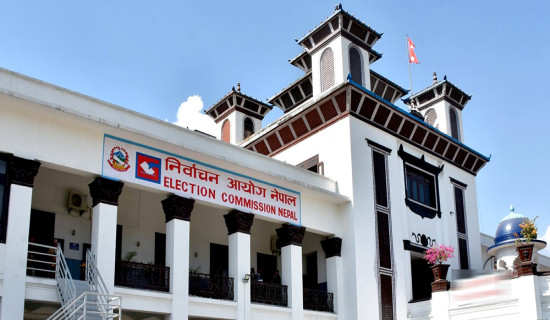- Thursday, 19 February 2026
Revoke Licences Of Errant Contractors
The construction industry is of paramount importance in the economy of any country because it contributes to infrastructure development. In Nepal, the construction industry is flourishing as construction projects are being embarked upon across the country. Construction projects should be taken as a pivotal component of development in view of the fact that the country is graduating to a developing country in November 2026. Despite the overarching importance of construction projects, all is not well. One of the overriding setbacks in such projects is inordinate delay. Other problems are related to planning, financial, logistical, procurement, payment, political factors and similar factors.
Proper planning is crucial to initiating any construction project. Poor planning can not only impede the execution of projects but also give rise to cost overruns. Design change is sometimes reported in construction projects. This may delay project completion on the one hand, while on the other, costs may shoot up. Further, poor planning may compromise the quality of projects.
Financial management
Financial management is one of the prerequisites of project execution. Initiating projects without managing finances may certainly delay project completion. So it would be judicious to manage adequate funds before embarking upon any project. Logistical support should be ensured before initiating a project. Construction materials, equipment and labour should be in place. It is reported that the country is facing labour shortages owing to the migration abroad of a large number of people for foreign employment. A project initiated without paying heed to necessary resources is bound to be stuck somewhere during its implementation.
The government awards contracts to contractors on the basis of the lowest bid. This practice is cost-effective from a financial point of view. However, other aspects such as technical capabilities and experience with construction of contractors need to be scrutinised during the bidding/tendering process. The contractor selected on the basis of the lowest bid may not have technical expertise, experience or resource mobilisation capacity. Selecting such a contractor may compromise the quality of the project. That is why selecting contractors on the grounds of the lowest bid seems to be flawed, which needs to be improved.
Sometimes, the government may not make timely payments to contractors owing to budget allocation issues, such as the non-release of the budget in time. In such a situation, contractors often abandon the projects mid-stream. They may resume the work after they have been paid. As such, the government should ensure the release of funds in time. Political instability is a vexing issue, as shown by frequent changes in government. When the government is changed, its successor may not pay attention to the projects being implemented by the erstwhile government. The project manager supervising a project may be replaced by a new manager, which may hamper the completion of the project.
Further, a lack of coordination between various government entities may also hamper project completion. For example, a road newly constructed by the Department of Roads may be dug up by the Nepal Electricity Authority to lay underground cables. Such a lack of coordination has been there for years. But no efforts seem to have been made to fix the problem. Nepal has tough topography. Carrying out construction works such as road building may be difficult owing to weak terrain, rock falls or landslides. The dozer culture has emerged in construction works. Local bodies are, in a sense, competing with one another in dozer-dominated construction works. This has further weakened the terrain.
Corruption and red tape can be regarded as other factors that hamper the timely completion of projects. A lengthy process of implementing projects certainly brings about delays in project completion. Further, the ugly head of corruption may not only delay a project but also compromise its quality. On the part of contractors, most of them have political nexuses or affiliations. Sometimes, political leaders or members of Parliament may be contractors themselves. They often get tenders by hook or by crook but do not show interest in completing the projects awarded to them. It is not that the government does not warn them when there are delays.
The government tends to extend deadlines again and again. Still, some contractors do not show interest in completing the projects. In such a situation, the government may terminate the contracts or blacklist the contractors. Contract termination is a burden for the government. On the one hand, the projects get stuck in the middle of implementation, while on the other, the contractors may themselves move the court, further delaying the projects. A project under litigation causes delays. On the other hand, after terminating a project, the government has to select another contractor, which is time-consuming and entails additional costs.
The government should therefore identify causes for project delays and develop a mechanism for implementing projects like clockwork. Project delays have several implications. Such delays may have a great impact on the economy of the country. The people for which a project is meant may be deprived of the benefits the project is expected to provide. So the trend of project delays must come to an end. For this, the government should develop a robust monitoring mechanism so that any project can be completed on time. This will save not only cost and time but also enable people to enjoy the benefits of a particular project.
Non-performing contracts
It would be pertinent to mention that Minister for Energy, Water Resources and Irrigation, Physical Infrastructure and Urban Development Kul Man Ghising has instructed the subordinate bodies to terminate non-performing contracts to end the practice of keeping projects in limbo for a long time. Recently, 25 contracts relating to road construction were terminated.
The contractors concerned failed to make progress on the projects despite repeated reminders and warnings. The government should rescind the licences of errant contractors with heavy fines, which will serve as a lesson for other contractors. After all, project delays have been a chronic malady, which must be remedied right now so that infrastructure development proceeds without let or hindrance.
(Maharjan has been regularly writing on contemporary issues for this daily since 2000.)

















